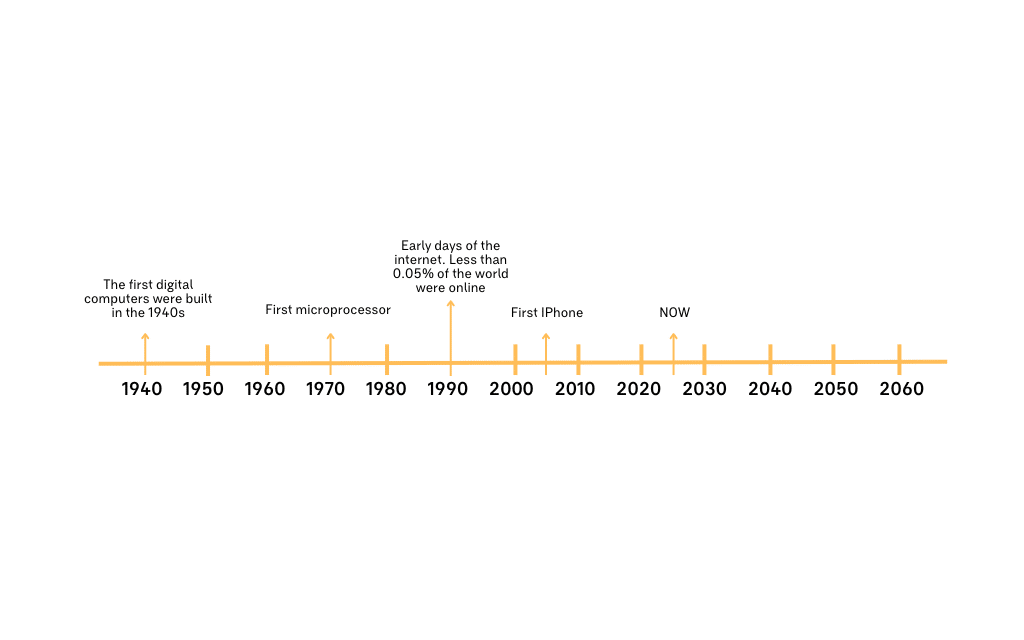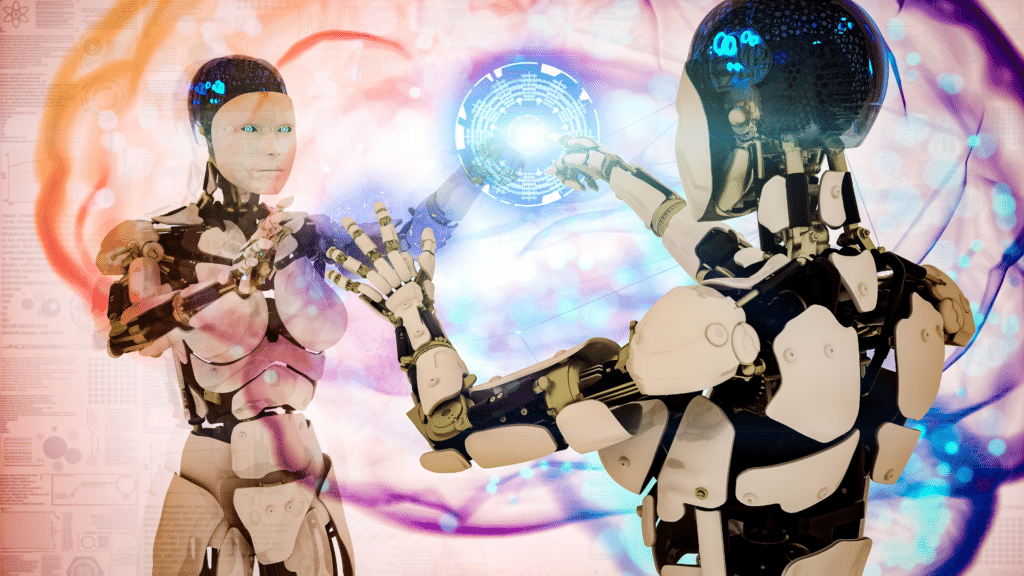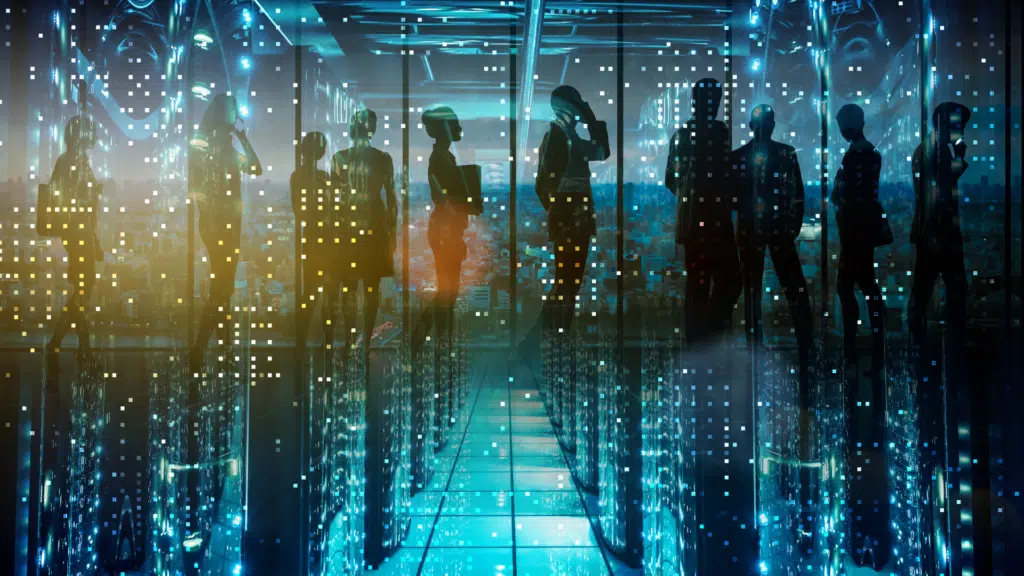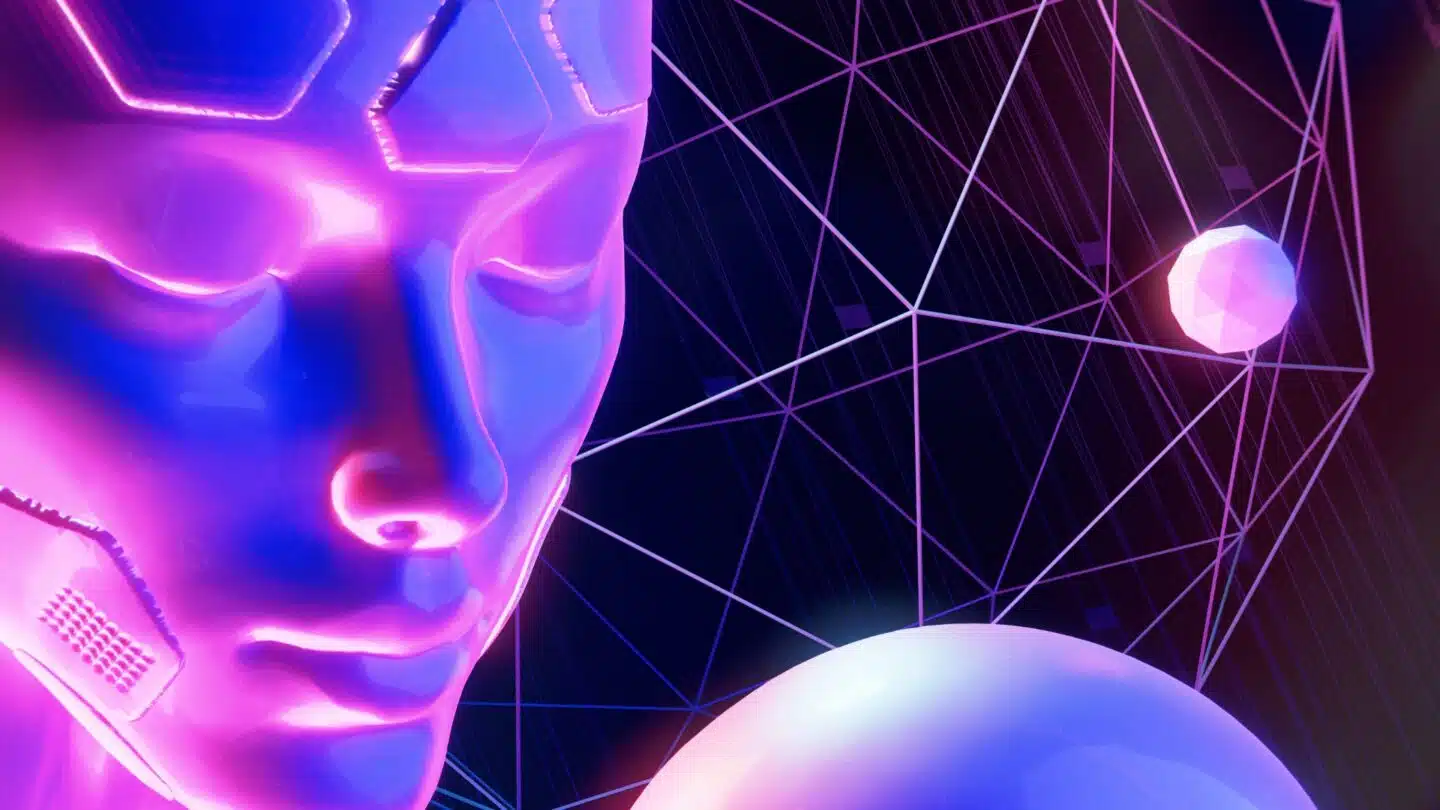Recent research has unveiled a (not so) startling revelation: 50% of AI researchers foresee at least a 10% likelihood of AI causing human extinction. We have all seen the films so it’s starting to get uncanny. As we step into an era where technology’s potential outpaces our understanding, questions of regulation, job security, and ethical considerations intensify. This influx of AI content prompts us to explore the middle ground between utopian aspirations and dystopian fears.
All intense philosophical stuff. So, let’s delve into AI’s intricacies, benefits, concerns, and ethical navigation.
First things first: Understanding AI today
Welcome to a global metamorphosis where AI, a synthetic/Frankenstein creature brought to life, infiltrates and transforms a myriad of sectors across the world. From the far-reaching domains of astronomy and healthcare to gaming and finance, AI’s impact is nothing short of profound, fortifying data security, sparking innovation in automotive, robotics and delivering personalised experiences across the digital landscape. In education and beyond, AI simplifies tasks, enhancing efficiency and engagement across the spectrum.
We don’t have to look too deeply to see where in our daily lives AI has infiltrated. It has seamlessly weaved into travel, from flight booking to airport monitoring and even piloting assistance. It exerts influence in decisions concerning loans, welfare eligibility, and employment, while also contributing to criminal justice release determinations. Governments also adopt AI for warfare and surveillance. Its capacity goes beyond the realm of technology, where it aids software programming, translation, and speech recognition-based virtual assistants. And with the reality of self-driving cars emerging, its role in scientific progress becomes increasingly pronounced. Its versatility is no longer a luxury but a necessity.

AI’s progress and advancements in recent years
Just how swiftly has AI grown over the age of technology as we know it?

The Benefits of AI & Technological Advancements
Embracing AI heralds a transformative era of untapped possibilities. This technology doesn’t just mimic human intelligence. It expands it, reshaping the very roots of infracture that props up society as we understand it. What once seemed confined to broad science fiction, is here with infinite potential and supercharging efficiency.
Mundane tasks have the potential to vanish into the realm of automation. AI’s brilliance lies in its ability to liberate us from the clutches of repetitive drudgery. By automating the routine, AI lets human ingenuity soar. (We are impatiently and cautiously waiting for the day).
In the realm of healthcare, AI’s potential is boundless. It isn’t just about smart diagnostics. It’s a lifeline that connects data dots, enabling early disease detection and personalised patient care. With AI as a steadfast ally, medical professionals gain unparalleled insight from vast pools of data. This isn’t just revolutionary; it’s life-saving. From speeding up drug discoveries to charting unexplored avenues of medical research, AI holds the key to a healthier humanity.
At the mention of happiness, utopia is a possibility…
Imagine streets that navigate themselves, energy that’s wisely distributed, and waste that vanishes with a whisper. AI, the unseen conductor, can ensure these urban dreams become reality. As our cities evolve into interconnected hubs, AI paves the path to a greener and safer environment – a testament to its power to shape our world.
To paraphrase OpenAI CEO Sam Altman, AI isn’t just a technology; it’s a catalyst for evolution.
The Concerns Surrounding AI
Unfortunately, it’s not all sunshine, rainbows and green cities. It’s so much more layered and complex than that. So disadvantages to be weary of. Where to start?
Ever watched the Netflix documentary “The Social Dilemma” (2020)? It sheds light on a significant paradox: social media executives who helped create and promote the platforms admit to abstaining from their own creations and preventing their children’s usage. The film explores the addictive design of social media, maximising profits, manipulating opinions, emotions, and behaviour, and even propagating conspiracy theories and misinformation. The same type of thing is going on with conversations with AI. From innovative tech pioneers, scholars, and engineers, the rapid advancement is triggering alarm bells.
This conflicting trajectory can be seen as a potential existential threat to economies, democracies, and humanity itself, which isn’t unprecedented in technological history. Leading figures in major tech companies caution about AI’s dangers while actively investing in its integration into products that impact billions of lives. Stuart Russell, a prominent AI expert who has advised both Downing Street and the White House, stands alongside over a thousand academics, tech moguls including Elon Musk and Apple’s Steve Wozniak, in an open letter from The Future of Life Institute, an NGO. The letter highlights the urgency of a six-month halt in AI development, aiming to address the escalating “out-of-control” AI race.
“Should we automate away all the jobs, including the fulfilling ones? Continue to develop non-human minds that might eventually outnumber, outsmart…and replace us? Should we risk loss of control of our civilisation?” These questions were asked last in the open letter from the Future of Life Institute.
Key concerns stemming from unchecked AI advancement include widescale job displacement across sectors like education, journalism, law, and academia. Additionally, the potential for disseminating misinformation, unauthorised accumulation of personal data, misuse of facial recognition for protest surveillance, and AI chatbots‘ negative influence loom large. AI’s potential to achieve human-like aims, including political power and god-like roles, is a real concern. Sundar Pichai, Google’s CEO, admits haunting thoughts about these possibilities, echoing concerns from figures like Sam Altman and Kevin Baragona. These concerns, voiced on the Centre for AI Safety’s website, add to the growing warnings of AI’s existential threat. Many AI creators like Yuval Noah Harari worry about weaponisation and dependency.

Assessing the Risk of an AI Apocalypse:
All major technological innovations lead to a range of positive and negative consequences. For AI, the spectrum of possible outcomes – from the most negative to the most positive – is extraordinarily wide.
The use of AI technology causing harm is clear because it is already happening. Particularly when AI is used in politically-motivated disinformation campaigns or to enable mass surveillance. AI systems can also cause unintended harm when they act differently than intended or fail. For example, in the Netherlands, authorities used an AI system that falsely claimed that an estimated 26,000 parents made fraudulent claims for childcare benefits. False allegations led to hardship for many families and also resulted in the resignation of the entire cabinet of the Dutch government in 2021.
As AI becomes more powerful, the possible negative impacts could become much larger. Many of these risks have rightfully received public attention: more powerful AI could lead to mass labor displacement or extreme concentrations of power and wealth. In the hands of autocrats, it could empower totalitarianism through its suitability for mass surveillance and control.
The alignment problem of AI is another extreme risk.
This is the concern that nobody would be able to control a powerful AI system. Even if the AI takes actions that harm us humans, or humanity as a whole. This risk is receiving little attention from the wider public, but it is seen as an extremely large risk by many leading AI researchers. It is about unintended consequences. The AI does what we told it to do, but not what we wanted it to do. The alignment problem arises because of “the impossibility of defining true human purposes correctly and completely,” as researcher Stuart Russell puts it.
If things get dire, can’t we then just switch off the AI? Get ready to spiral. This might also not be possible. That is because a powerful AI would know two things: it faces a risk that humans could turn it off, and it can’t achieve its goals once it has been turned off. As a consequence, the AI will pursue a very fundamental goal of ensuring that it won’t be switched off. This is why, once we realise that an extremely intelligent AI is causing unintended harm in the pursuit of some specific goal, it might not be possible to turn it off or change what the system does. However, this is all theoretical. Humanoid robots have said at AI summit in Geneva earlier this year, that they have no intention of hurting humanity. Does their word count for anything?

Navigating the Ethical Frontier of AI Technology
Striking an equilibrium between innovation and responsible integration is essential. As we tread the uncharted territory of AI’s transformative power, the choices we make today will sculpt the contours of a future where technology and humanity coexist in harmony.
“There has been a lot of emphasis in the media on AI leading to human extinction or the collapse of civilisation,” says Cave. “These fears are exaggerated but that does not mean AI will not cause harm to society if we are not careful.” – Director of the Leverhulme Centre for the Future of Intelligence, Senior Research Associate and Philosopher Stephen Cave
Michael R. Strain of the American Enterprise Institute takes issue with “the pessimistic view” that AI will destroy what we value most. In his view, “like all general-purpose technologies before it,” AI can be expected not only to improve human welfare, but also “brighten the outlook for democracy’s long-term survival.”
It comes down to human intelligence
As we move forward, an important question arises: Can the same human intelligence that developed these impressive technologies steer their course responsibly? The balance between immense potential and significant risks reminds us that AI’s fate depends on human choices.
A little shoutout to AI and digital marketing
Of course, we had to add this in.
Among the myriad transformations brought about by technological advancements, the realm of digital marketing stands as a beacon of the symbiotic relationship between new technology and human enterprise. Through generative AI and natural language processing, companies can craft more personalised and persuasive messages that resonate with consumers. Supply chain management can be revolutionised, allowing for the creation of more informed decisions and streamlined operations. This synergy between human creativity and AI’s analytical prowess has unlocked unprecedented avenues for businesses to access, engage, and understand their customers.
As the internet becomes an ever-evolving marketplace, digital marketing emerges as both a testament to AI’s potential and a testament to our ability to leverage its power for mutual benefit.
Shall we end this on a high? Speaking of new technologies, ever heard of Wooshii Insight?




